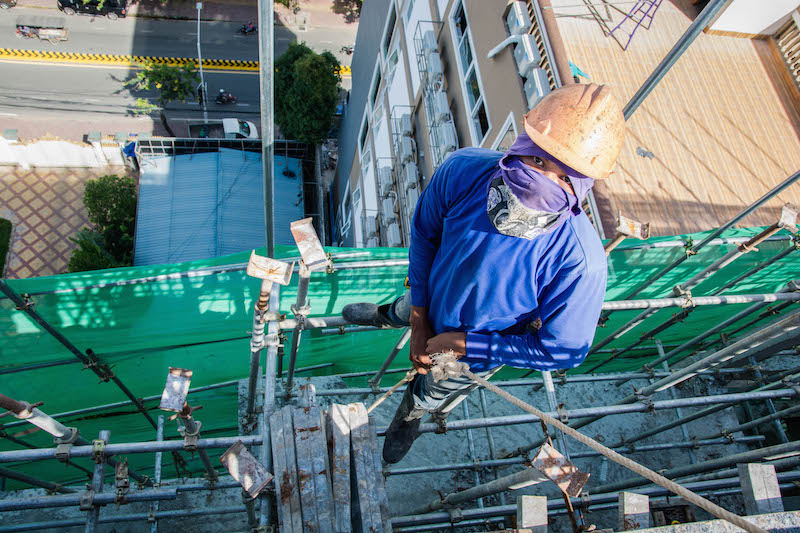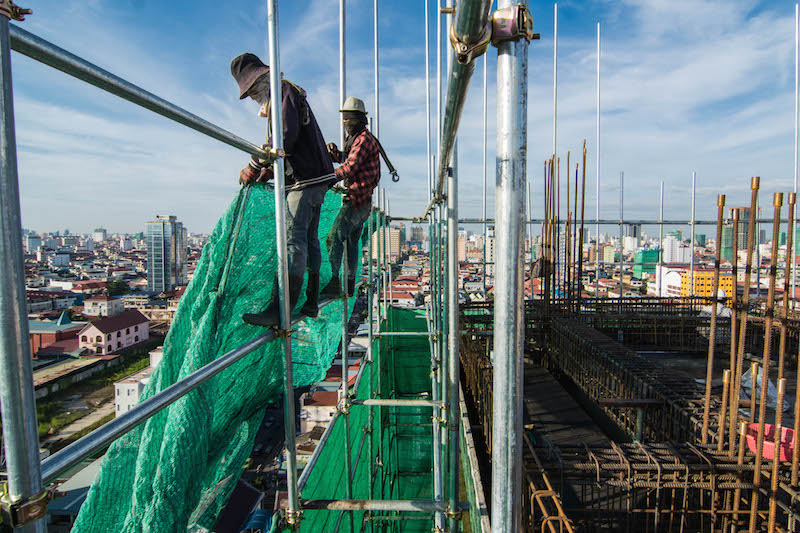Sroeun, 43, a former rice farmer from Kandal province, said he was sure there had never been any accidents at his construction site.
“Small things happen. Scratches on our hands,” he said, declining to give his full name as a supervisor stood nearby during a break from in front of his construction site outside Phnom Penh’s Olympic Stadium.

Sroeun, who has been in the capital for a few months, said he had never seen the site inspected, either. And the construction company, which posted warnings about helmets at the entrance to the site, didn’t have any budget for safety equipment, he said.
“We wear a safety harness,” he said, growing increasingly uncomfortable when asked questions about what measures were taken to ensure safety on the site. “We’re careful.”
While there are tens of sub-decrees on the subject of occupational safety in Cambodia—everything from Prakas 52, which mandates that employers keep a sanitary toilet, to Prakas 124, which requires that a workplace be kept at a tolerable temperature—enforcement is either poor or non-existent, leaving the safety of workers almost entirely up to employers.
That was the message coming from construction consultants and companies who participated in a workshop on the topic on Thursday in Phnom Penh.
“The prakas? They’re just there,” said Lun Borey of 3G Agents, a safety consulting firm that ran the occupational safety workshop on Thursday for the European Chamber of Commerce. “Safety is mostly [the companies’] initiative, not the government’s.”
Statistics from the Labor Ministry, provided by 3G Agents, show tens of thousands of workplace accidents reported in Cambodia in 2012 and 2013, with the number climbing along with the number and scale of construction projects. But with little will for enforcement, the burden to stop the trend falls on companies, either as a moral imperative or to prevent their firm from ending up in the news after a workplace accident or death.
During the workshop, one participant asked: “Currently, are there any penalties for companies that don’t apply safety management practices?”
Another participant, who worked in road construction, answered: “From my experience, there are no penalties here.”
Mr. Borey said that his 50-odd clients were making sure their construction sites were safe, but that many developers were taking a less cautious approach, meaning the Labor Ministry’s statistics likely underestimated the problem.

The real number of accidents? “It happens crazily, all over the country, but it’s not public,” he said. The only check on bad safety practices, in most cases, he said, was the public and the media.
“There’s no enforcement from the government,” he said. “But, at the end of the day, the company will face public attention—a bad reputation. Then the government will have no choice [but] to shut the company down to save their own face.”
Man Sotharin, managing director of a company that sells safety equipment, agreed with Mr. Borey’s assessment, explaining that local companies reported accidents only if it might benefit their bottom line.
“Companies under NSSF report accidents,” he said, referring to the National Security and Safety Fund, which provides its members with basic accident insurance. “There are companies not under NSSF—they don’t report.”
From his experience, the companies that did invest in workplace safety—buying equipment from him, for instance—were from overseas or had international clients, he said.
“Very few local companies worry about this. They ask why we need to apply these standards—why spend money on this?”
Compounding the problem, Mr. Borey said, was that workers themselves often did not think too much about their own safety, and certainly would not consent to having insurance or equipment costs deducted from their daily wage of $5 to $10.
“They work from day to day. Their worry is to fill their bellies,” he said.
Sok Khom, 21, who has been working in construction in Phnom Penh for about a month, offered a case in point.
“I came here to find money to help those at home,” he said, standing in flip-flops in a sandy construction site in Phnom Penh, leaning on his shovel. “There are no dangers.”



